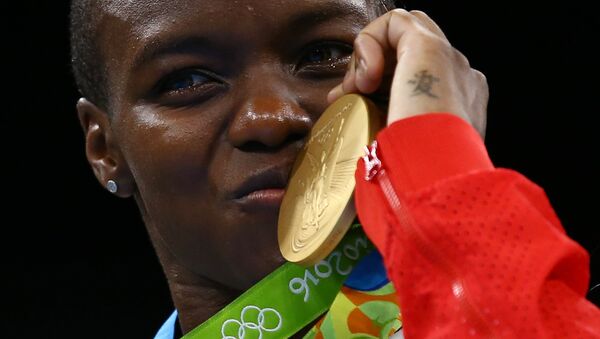Earlier this week, the hacking group leaked alleged WADA documents showing that the agency allowed US tennis players Serena and Venus Williams, as well as Olympic gold-winning gymnast Simone Biles and basketball star Elena Delle Donne, to take banned substances for "therapeutic" purposes.
On Friday, the hackers released a third database, which includes 11 athletes from five countries, including the United Kingdom, Denmark, Australia, Spain, and Germany.
— Fancy Bears' HT (@FancyBears) September 16, 2016
One of the athletes featured is the UK’s Nicola Adams, who won a gold medal at the 2016 Rio Olympics. The database shows that Adams received Therapeutic Use Exemption (TUE) in 2009 for the use of salbutamol, salmeterol, and fluticasone propionate, all of which are listed as banned substances by WADA.
The database details that in 2016, Adams was granted a TUE for the use of methylprednisolone, commonly used to treat arthritis.
Mireia Garcia Belmonte, who won a gold and bronze medal in swimming for Spain, is also on the list. In 2013, Belmonte received a TUE for salbutamol, typically used to treat asthma.
"It appears that in sport, such drugs are taken under special schemes so that they don’t damage [the athlete’s] health. The drugs give athletes an advantage in sports that require them to endure intense physical activity," Moscow State University pharmacologist Nikolai Korobov told RIA Novosti.
While the West attempts to distract from the issue by baselessly accusing the Russian government of being behind the WADA hacks, Kremlin spokesman Dmitry Peskov refuted these allegations Tuesday.
"It can be stated with all certainty that there is no involvement of the official Moscow, [Russian] government or special services in such actions. This is completely ruled out," he told reporters.
"These unfounded allegations…do not honor any organization, if they are not backed by something substantial. I do not know whether those who came out with such statements possess any substantial arguments."
Peskov added that Moscow stood ready to assist in an investigation into the hack.
"Russia has voiced its support for participation in the effort against cybercrime, and invites all the partners and international organizations concerned for cooperation in that area," he said.





